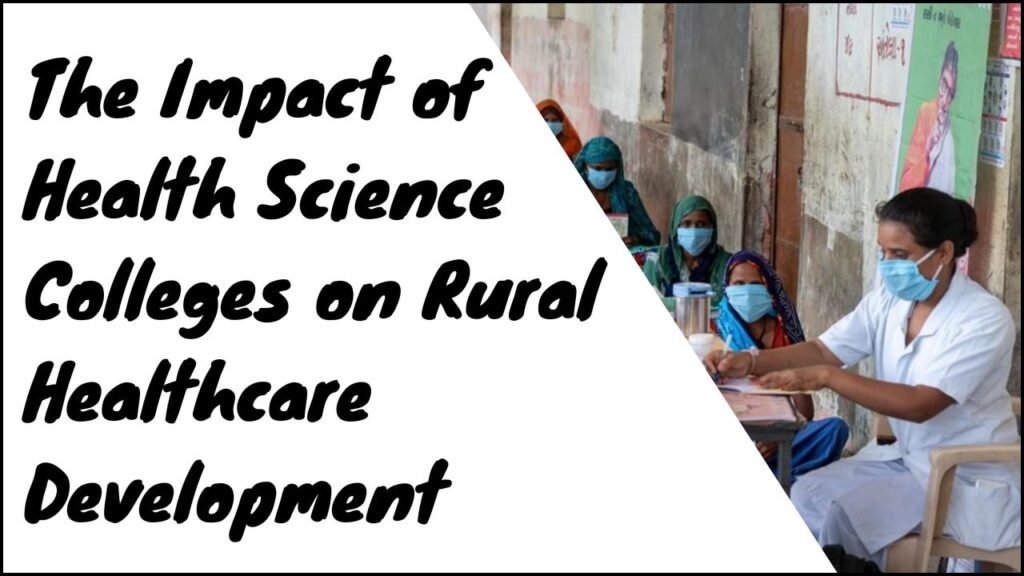
Health Science Colleges play an important role in improving rural healthcare. These colleges not only educate future healthcare professionals but also provide medical services, awareness programs, and research tailored to rural needs. Their presence in rural areas helps bridge the gap between urban and rural healthcare systems, offering long-term benefits for both individuals and communities.
Table of Contents
1. Better Access to Healthcare
- Local Workforce Creation
Health Science Colleges train students from rural areas who are more likely to stay and work locally after graduation. This reduces the shortage of doctors and nurses in rural areas. - Healthcare Facilities Near Colleges
Most colleges have attached hospitals or clinics. These facilities provide affordable and accessible care to rural populations. - Support Through Telemedicine
Some colleges offer teleconsultation services, helping patients in remote areas talk to specialists without traveling far.
2. Health Awareness and Education
- Community Outreach
Colleges conduct regular health awareness camps in nearby villages. These camps focus on nutrition, hygiene, and disease prevention. - Workshops and Seminars
Health Science Colleges organize workshops for school children, women, and the elderly to share important health knowledge.
3. Research for Rural Health
- Focus on Local Issues
Research projects often target health problems common in rural areas, like anemia, malnutrition, and infectious diseases. - Affordable Innovations
Colleges work on low-cost medical equipment and simple treatment methods suited for rural use.
4. Government Collaboration
- Support for Public Health Schemes
Colleges help implement government health programs such as vaccination drives and maternal health schemes. - Training for Rural Health Workers
Many colleges offer special training for ASHAs (Accredited Social Health Activists) and ANMs (Auxiliary Nurse Midwives).
5. Economic and Social Development
- Employment Opportunities
Colleges offer direct and indirect jobs to locals, including roles in administration, security, cleaning, and maintenance. - Healthcare Access Improves Productivity
Healthier individuals can work more, contributing to the local economy and improving living standards.
6. Challenges Faced by Rural Health Science Colleges
| Challenge | Details |
|---|---|
| Limited Infrastructure | Rural regions often lack roads, buildings, and power needed for medical education. |
| Low Student Retention | Students may leave rural areas after graduation for better urban jobs. |
| Insufficient Funding | Many colleges struggle with limited budgets for research and equipment. |
| Lack of Faculty | Qualified teachers may be unwilling to work in rural areas. |
7. Use of Technology
- E-Health and Telemedicine
Colleges introduce digital tools like telemedicine and online health records, making healthcare easier to manage in rural regions. - Mobile Health Units
Some colleges operate mobile clinics, reaching patients in the most remote villages with basic services and medicines.
8. Case Studies
| Institution | Contribution to Rural Healthcare |
|---|---|
| AIIMS Rishikesh | Runs mobile clinics and free health camps in nearby villages. |
| Manipur University (Medical Department) | Trains students in real rural settings through partnerships with local health centers. |
| Kalinga Institute of Medical Sciences | Offers telemedicine support to rural Odisha and works on low-cost healthcare innovations. |
9. Role in Disaster and Emergency Response
- Quick Medical Response
Colleges help during health emergencies like disease outbreaks and floods by sending medical teams to rural areas. - Training in Emergency Care
Students are trained to respond in emergencies, which helps during sudden health crises in villages.
10. Strengthening Rural Health Infrastructure
- Development of Health Sub-Centers
Colleges assist in setting up small health centers in nearby areas, providing basic care and monitoring chronic illnesses. - Support in Maternal and Child Health
Programs focus on prenatal care, child vaccinations, and nutrition awareness to reduce maternal and child mortality.
11. Encouraging Students to Serve in Rural Areas
- Rural Postings as Part of Training
Some colleges include rural internships to expose students to real-life village health scenarios. - Incentives for Rural Service
Scholarships and job preferences are given to those who agree to serve in rural healthcare after graduation.
Final Thoughts
Health Science Colleges have a powerful impact on rural healthcare. They educate local professionals, improve access to treatment, raise awareness, and support rural health systems through research and innovation. Though challenges exist, these colleges bring lasting benefits to underserved regions. Continued support and investment in these institutions can further strengthen rural healthcare and ensure healthier lives for people in every corner of the country.





